Thinking of traveling soon? Already received your COVID-19 vaccine?
We’ve already talked about how more individuals in Florida and California will soon become eligible for the COVID-19 vaccine, and how you might need a vaccine passport for travel and more this summer. But now we’ve got an update from the U.S. Centers for Disease Control and Prevention (CDC) regarding domestic and international travel for those who are already fully vaccinated.
Recently, we shared how the CDC updated its guidance regarding certain activities that fully vaccinated individuals may now do without masks. Now, the CDC has updated its guidance regarding travel for those who are fully vaccinated.
Keep in mind that according to the CDC an individual is “fully vaccinated” 2 weeks after their second dose in a 2-dose COVID-19 vaccine series (like Pfizer or Moderna), or 2 weeks after a single-dose vaccine (like Johnson & Johnson).
Under the updated guidelines, the CDC recommends delaying travel until you are fully vaccinated, “because travel increases your chance of getting and spreading COVID-19.” If you ARE fully vaccinated with an FDA-authorized vaccine, the CDC now notes that you can travel safely within the United States.
According to the updated guidance, “fully vaccinated travelers are less likely to get and spread COVID-19.” The CDC notes that fully vaccinated travelers do NOT need to get tested before or after travel, unless their destination specifically requires it. They also state that fully vaccinated travelers do not need to self-quarantine.
Fully vaccinated travelers should still follow the CDC’s recommendations for traveling safely, however, to protect others if they travel. This means fully vaccinated travelers should continue to:
- Wear a mask over their nose and mouth during travel (a reminder that the CDC has issued an order requiring individuals to wear face masks while on public transportation in the U.S. and while at transportation hubs);
- Avoid crowds and stay 6-feet away from anyone not traveling with the vaccinated traveler; and
- Wash their hands often or use hand sanitizer.
You can get a look at some of the updated guidance below.
If you are not fully vaccinated and you must travel, then the CDC outlines separate steps to be taken including testing before you travel, testing after you travel, and more.
Here’s a look at a chart created by the CDC regarding domestic travel and the guidance for fully vaccinated vs. non vaccinated individuals.
Keep in mind that states, local areas, and territorial governments may have their own specific travel restrictions in place, including testing requirements, stay-at-home orders, and quarantine requirements. You’ll want to check those before travel to ensure that you’re following all state, local, and territorial restrictions.
These specific updates referenced above, regarding guidelines for vaccinated vs. unvaccinated individuals, all relate to domestic travel.
If you are traveling internationally, the CDC has separate guidance for that. Specifically, the guidance notes that fully vaccinated travelers are less likely to get and spread COVID-19, but that international travel poses additional risks. The CDC shares that “even fully vaccinated travels are at increased risk for getting and possibly spreading new COVID-19 variants” when it comes to international travel.
So, the CDC recommends delaying international travel until you are fully vaccinated. If you are fully vaccinated (with an FDA-authorized vaccine) then the CDC guidelines indicate you should continue to get tested after travel, but you do not need to get tested before leaving the U.S. unless your destination requires it.
Like with domestic travel, the CDC still notes that fully vaccinated travelers going on international trips should wear masks, avoid crowds, and wash their hands often.
You can see the chart below regarding the differences in recommendations for international travel for those who are fully vaccinated vs. those who are not vaccinated.
If traveling internationally, you’ll still need to check with your destination’s government or health department to see their requirements and restrictions, and check with your airline for any requirements.
According to the Washington Post, the CDC updated its recommendations because of “newly released studies showing the real-world effectiveness of the vaccines.”
You can get more updates and read the full details of these policies on the CDC website. We’ll continue to keep an eye out for more updates and let you know what we find.


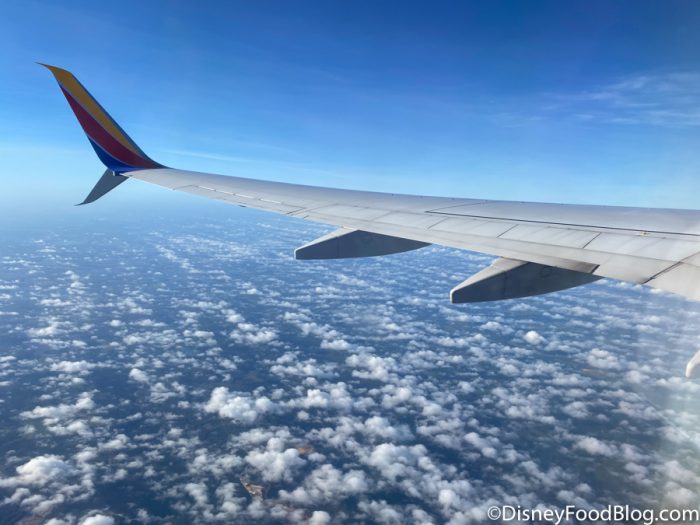


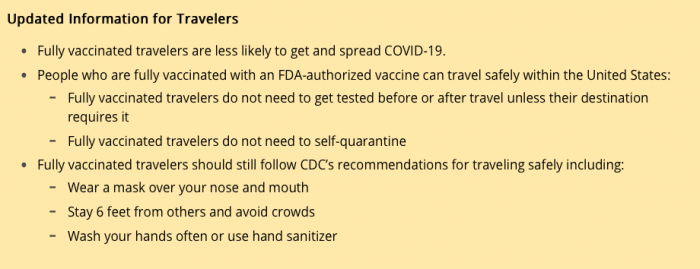
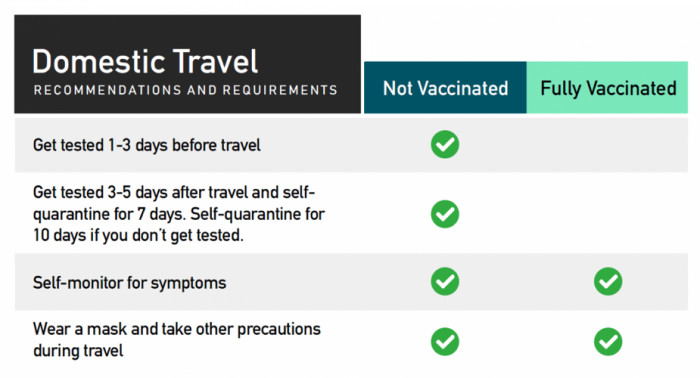

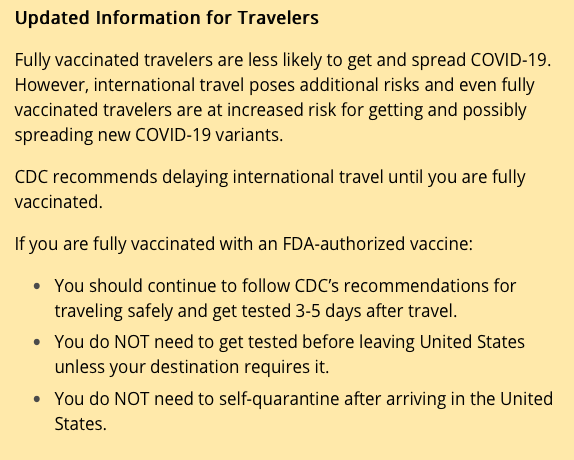
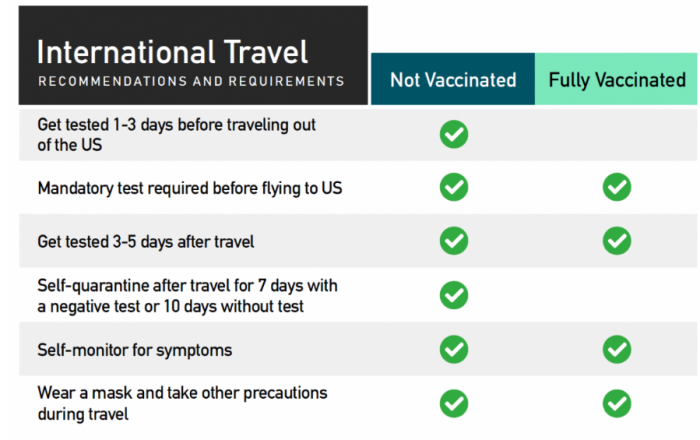

 »
»



















 Our handy (and portable!) ebook guides make sure you get the best deals and can plan a vacation of a lifetime.
Our handy (and portable!) ebook guides make sure you get the best deals and can plan a vacation of a lifetime.

So if you are fully vaccinated, you still need to wear a mask and unsocial distance. What was the purpose of that vaccine, again?
Inconvenient truth: the vaccines don’t prevent you from being infected or passing the virus. It only covers up the felt symptoms. Lots of OTC medications do the same thing and are safer.
Oh, and I will travel as I wish, because that’s my right, and the CDC is not a legislative nor law enforcement agency.
The CDC is overstepping it’s authority. Remember “land of the free home of the brave”? That’s a foreign concept to them.
The CDC does not have ANY authority to tell any American whether or not they can travel in the United States. This is plain garbage.
Since many people refuse to listen to the doctors, who are experts in infectious disease, the CDC is tasked to remind them of such risky behavior. Those with common sense and decency will comply, while others will not. Let’s stay healthy and get through this pandemic safely! Remember, COVID-19 is caused by the corona virus and viruses don’t care who you are.
At no point have we ‘not’ been allowed to travel. It’s a silly statement. The CDC is not even a legislative body. I have been traveling for the past year and frankly it’s been glorious.
And how will they know we are vaccinated? I refuse to have to show proof. It’s my protected health information.